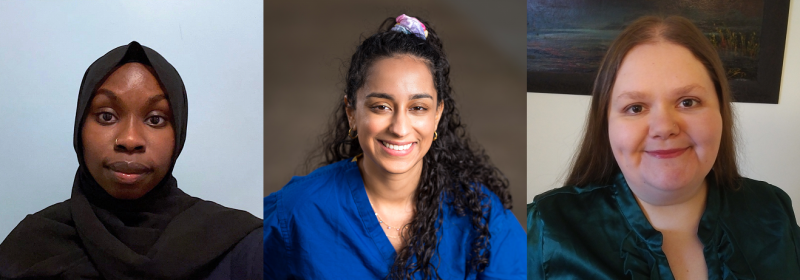
Congratulations to the recipients of this year’s Charity-funded research fellowship, which will allow them to conduct their own research at Royal Brompton and Harefield hospitals.
The Charity-funded research fellowship funds NMAHPPs (nurses, midwives, Allied Health Professionals, healthcare scientists, pharmacy staff and psychologists) to undertake up to 12 months of research, allowing them to develop research skills, produce data and apply for further funding.
The scheme is generously funded by the Royal Brompton and Harefield Hospitals Charity and is now in its fourth year.
Richard Bowyer, chief executive of the Charity, said:
“Innovative research projects, which Royal Brompton and Harefield hospitals are known worldwide for, are essential for creating future treatments for heart and lung disease.
“At Royal Brompton and Harefield Hospitals Charity, we are passionate about supporting the projects that will save and transform the lives of heart and lung disease patients, which is why we are proud to fund these three fellowships that will improve outcomes for patients and help keep the hospitals at the leading edge of patient care.”
You can read more about the recipients and their projects below.
Mary Abkir, respiratory physiologist
Mary’s project aims to look at the reference ranges used in breathing tests carried out on paediatric patients, which are used to determine what is ‘normal’ for an individual.
However, for most advanced lung function tests, these ‘normal’ values have been calculated from data obtained from healthy Caucasian people. These same values are used to represent the ‘normal’ ranges for people of all ethnicities.
Mary’s research aims to determine if these ‘normal’ ranges are different for people from ethnic
minorities. If differences do exist, use of inappropriate ‘normal’ ranges could lead to disease
being missed or over-diagnosed in these populations, contributing to health inequalities.
Her pilot study will be the first step towards establishing normal ranges of these tests in ethnic minorities.
Mary said:
“I feel extremely honoured to have been awarded the fellowship. I hope this will be a chance to making a step toward ensuring clinical decisions, from specialised respiratory function testing, is truly representative of all patient backgrounds. I am excited to see where this could go.”
Rasleen Kahai, dietitian
Rasleen’s project will be looking at the treatment of malnutrition in patients with Interstitial Lung Disease (ILD), a term used for a group of diseases which can cause scarring of the lungs.
ILD can cause malnutrition due to the lungs working hard and burning off energy. The anti-fibrotic medications given to ILD patients also have side effects which include poor appetite, diarrhoea, nausea, vomiting and weight loss, which can lead to malnutrition.
Not only can malnutrition in ILD reduce eligibility for lung transplant but it can also impact the tolerability of anti-fibrotic agents. Research into treatment of malnutrition in ILD is limited.
Rasleen’s project will be a feasibility study to determine if ILD patients can be recruited to see a dietitian and whether patients will attend dietetic appointments.
The secondary aim of the study is to provide preliminary data on whether dietetic intervention can help stabilise weight, and/or improve quality of life.
Rasleen expressed how “grateful and excited” she felt on receiving the fellowship and spoke about the importance of the research.
“We know that nutrition in respiratory medicine is incredibly valuable but is so often under resourced and under researched. I am delighted to be working with Dr Elisabetta Renzoni, Professor Athol Wells and Gemma Stanford to look at innovation in this crucial area of healthcare and be one of the first to look at the impact of nutritional intervention in patients with ILD.
“Thank you especially to the Charity for this brilliant opportunity.”
Dr Sam Irving, chief paediatric respiratory research physiologist
Sam’s study aims to determine whether a specialised lung function test used for children with cystic fibrosis can also be used to assess lung function in children with bronchiectasis.
Bronchiectasis is a condition where the airways of the lungs become widened, leading to a build-up of excess mucus that can make the lungs more vulnerable to infection.
The disease is rare in children and young people which makes it difficult to know what tests are best for monitoring the disease.
For patients with cystic fibrosis a test known as lung clearance index (LCI), is used which is safe and easy to perform. Sam’s study aims to determine if LCI can be used in children and young people with bronchiectasis. Her study will determine how consistent the results are and how likely the test is to pick up any abnormalities.
On receiving the award Sam said:
“I am delighted to have been offered the opportunity to conduct this research into physiology outcomes of children with bronchiectasis. Bronchiectasis in children is a rare condition and tertiary services such as ours are in a unique position to work with patients and their families to address their research priorities.”
To find out more about our research, please contact us.
Read more of our research stories or sign up to our research newsletter.
